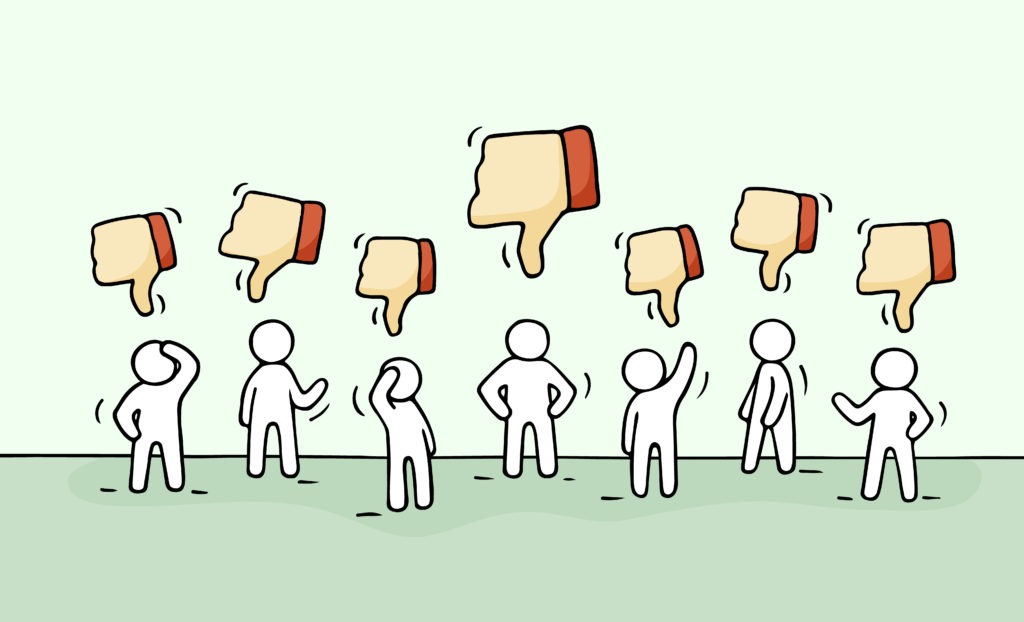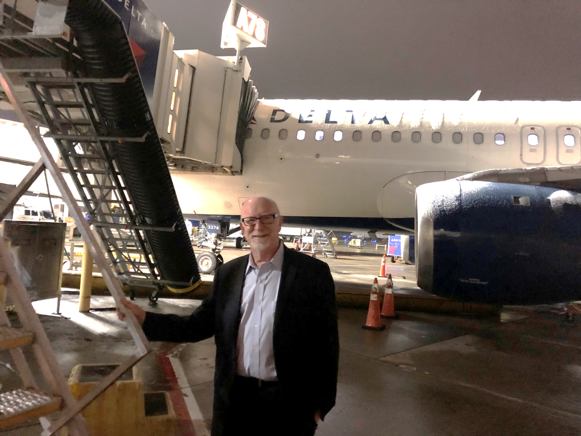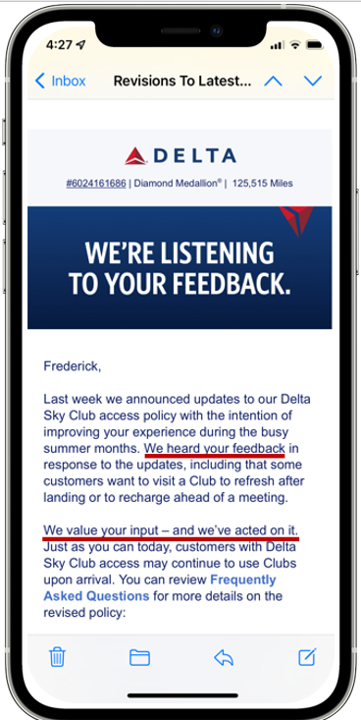 We’ve all been there. There’s a decision to be made, and perhaps you’ve even done some research that gives you the green light.
We’ve all been there. There’s a decision to be made, and perhaps you’ve even done some research that gives you the green light.
So, you make that tough call, only to face immediate backlash. And not just an unhappy email – a thunderstorm of vitriol and negativity – the kind the might even make you start questioning whether your call was the right one.
Thanks to social media, these same disgruntled fans have the ability to make their dissatisfaction known – with anger that threatens to go viral. They may start a group or separate page focused on letting you know just how unhappy they are. Or even go to the local media with their grievance.
– with anger that threatens to go viral. They may start a group or separate page focused on letting you know just how unhappy they are. Or even go to the local media with their grievance.
What’s your move?
In the past, radio stations have typically taken the stiff upper lip position. After all, we’re the captains of our brands.
Management decisions can be unpopular. A format change, the morning team has been shown the door, or maybe a weekend show has been cancelled. All these moves signify a segment of the fan base will be angered.
But what happens when your decision pisses off your very best fans, your Super P1s, your most loyal customers?
That’s exactly what Delta managed to do early this month when one of their frequent flyer policies was changed, much to the chagrin of their biggest users.
 And it turns out, I’m in that group – a multi-year “Diamond” – the top of the heap – in their Sky Miles program. In fact, I’m a 3 million mile flyer, a status distinction that is frequently mentioned when I interact with Delta employees. I’ve enjoyed some nice perks over the years, including being shuttled in a Porsche SUV from terminal to terminal to make a tight connection.
And it turns out, I’m in that group – a multi-year “Diamond” – the top of the heap – in their Sky Miles program. In fact, I’m a 3 million mile flyer, a status distinction that is frequently mentioned when I interact with Delta employees. I’ve enjoyed some nice perks over the years, including being shuttled in a Porsche SUV from terminal to terminal to make a tight connection.
The change probably seemed innocuous to Delta execs. One of the benefits of being a Diamond is I can opt for free access to the airline’s Sky Clubs, nicely appointed lounges in most of the airports I frequent. Many others pay for the privilege of accessing these oases in the most crowded airports.
The new policy? To deal with increasingly more crowded lounges, Delta decided to eliminate access to a a club after the flyer lands at her destination.
You’re wondering why anyone would want to visit a Sky Club after arriving at the destination airport. I’ll tell you, because I do it all the time.

It’s a chance to make a call or two before jumping in an Uber. Or run into the restroom inside the Club, always a much better option (especially during COVID) than the airport’s public facilities. And because the food is usually good in these Sky Clubs, I’ve been known to grab a bite, a cup of coffee to go, or both.
Delta simply sent a direct email to its Sky Club members notifying us of this new rule. I remember reading it, and immediately reacting with a “WTF?!” But I was in the middle of my Techsurvey 2022 marathon presentations, and didn’t take the time to shoot Delta an email with my negative feedback.
Fortunately, a number of my compadres took the opportunity to give the airline a piece of their collective minds. According to a story in Inc. by columnist Jason Aten, Delta declined to comment on the number of unhappy responses to their rules change that impacted their very best flyers.
But suffice it to say, the email protest worked. Eight days later, Delta rescinded their policy change. Here’s the follow-up communiqué they sent to Sky Club members. The underlining is mine:

That’s what you want to hear from companies and brands with whom you interact:
- We heard your feedback
- We value your input – and we’ve acted on it
The Inc. story’s title says it all: “Delta Was Facing Intense Pushback From Unhappy Customers. Its Response Is Brilliant. (Listen to your customers.)”
The airlines, in particular, are (in)famous for abusing their customers. If you were in U.S. airports over the holiday weekend, there’s a good chance you’re not the happiest of campers this morning. So when one of the biggest airlines lets you know they heard customer concerns, and then acted on that feedback by cancelling their policy, it gets your attention.
Through the years, many radio stations have not acted with their fans’ best interests in mind. Formats flip, talent is terminated, commercials are written on the log, and the phones go unanswered.
Delta’s handling of this strategic snafu is admirable, and provides a road map for how to serve your fans, especially your very best ones:
1. Lay it out clearly – In its initial email outlining their new Sky Club policies, the airline explained the decision to limit access was based on a surge in the number of travelers. They might have mentioned the lounges are becoming increasingly crowded, sometimes having to turn away members due to congestion. Too often, radio waits until Friday at 5pm to unveil a new format or to let public-facing staffers go. These maneuvers may be expedient, but they only serve to anger and alienate fans who just want to know the “why” of a decision.
2. Put your name on it – On both Delta emails, they’re signed by Claude Roussel, Managing Director – Sky Clubs. It helps to know who’s responsible, whether it’s an unpopular decision, a new feature, a change in policy, or whatever a brand does that impacts its audience base. Claude may have had a couple of bad days when the initial policy was laid down. But that’s his job – it’s what he signed up for. These days, it helps to have a go-to person.
3. Do your homework – Ostensibly, Delta ran this new policy against a panel or sample of Sky Club members. Although based on the apparent reaction, this is an important step that may have been skipped. Some top-down decisions don’t have a measurable impact one way or the other. But in this case, limiting club access was an instant slap in the face of some of the company’s biggest fans. It’s something that would have been easy to learn, thus avoiding this mess in the first place.
4. Carefully monitor reactions – When a radio station cuts a personality or show loose, I’ll ask a station about listener feedback. Often I hear, “We got maybe a dozen emails. That’s it!” But those are just the people who bothered to make their unhappiness known. There is an unknown multiple of pissed off fans who don’t send an email or call the station. Is it 10x? 100x? We don’t know. Delta didn’t disclose how many angry emails they received, but it had to be an impressive number and they knew many came from the equivalent of their Super P1s – not a group to mess with.
5. Be open to admitting a mistake – quickly – It’s one thing to make the wrong decision; it’s another to deny it. Delta not only considered the feedback from its most frequent flyers, it rescinded the least popular part of their new policy. It took them just eight days to put the decision in place, collect and consider feedback, reverse course, and get the word out there. That’s pretty darn good.
6. It is all about taking action – We’re all tired of institutions like the government that simply cannot get anything done. Here’s a global corporation that had to suck it up, reverse course, and quickly put a new policy into effect. It’s much harder to hold a grudge against a company that is committed to solving problems expeditiously. Actions do speak louder than words.
7. Be a lemonade maker – How do you turn an unpopular decision into a positive? Delta found a way. Do their frequent flyers feel better as a result of this turnaround? Maybe not, but it reinforces some of the smart moves the airline has made in the past. It is a way for them to “bank” positive perceptions. Airlines by their very nature will disappoint customers with the inevitable delays, lost luggage, cancellations, and other indignities – it’s part of the business. Collecting “good faith points” is important for any brand. (Make sure to read the postscript at the end of this post.)
8. It’s a team effort – Claude’s name may be on these Sky Club emails, but you can bet the ability to reverse a decision is a cultural policy for Delta, where staffers are empowered to make things right. In an environment where most employees aren’t given the ability to right wrongs, Delta’s company-wide spirit of “customer first” almost always makes it easy for any Delta team member to make the right call.
9. Listen to your customers – It’s the subtitle on Aten’s column for a reason. Many brands simply fail to do it, including many radio stations that have simply not been especially open to fan feedback. I’m not a believer in “the customer is always right.” In our social media revolution, many are downright unrealistic and even mean. But when you do something that opens the floodgates, and a number of your fans believe you screwed up, it’s worth listening to them. If necessary, react to the problem, and if you can, fix it.
I realize there are sometimes legal reasons why a station cannot come clean about one of these situations. When your company attorneys advise you to not go into details, you’d be smart to listen to them. But it is still possible to be there for fans, especially when it’s the departure of a beloved personality. Fans just want to be heard.
By making an effort to listen to your listeners, respond to them on a timely basis, and if necessary or possible, make it right, you’ll set yourself apart from most stations in your market. Dedicating you and your staff’s efforts to listen, consider, and act can pay back handsomely in an environment where so many brands are simply not trusted.
Many businesses have gotten the “customer service” memo in recent years. They invest heavily in systems, training, and response. In radio, this culture has not been an integral part of how most stations operate. Where there’s a commitment to serving listeners, it is often initiated by an enlightened manager or personality, rather than a consistent station policy.
It doesn’t require a substantial investment to listen, respond, and act. It is more of an issue of serving fans, and understanding what can happen when brands just don’t care.
Postscript: Like any brands, Delta has its “moments.” Even when you have systems and training, things can go wrong. In another Inc. story by Jason Anten, a weak moment on Twitter blew up in Delta’s face. Again to their credit, it didn’t take them long to come to their senses, apologize, and move on. You can read it here.
- Media And Technology In 2025: Believe It Or Not! - April 18, 2025
- In Radio, You Just Never Know - April 17, 2025
- The Secret To Making A Great Podcast (And Great Radio) - April 16, 2025




Hey Fred — I’m also an exclusively Delta flyer (Platinum), not in your 3-million miles league, but I’m loyal and I enjoy benefits including the lounges. I was distressed by the initial policy change (and painfully disappointed in a brand I enjoy promoting online and to my friends). That second email restored and bolstered my attachment.
I’m sure many of us reacted the same to the change – and then the correction. They generally do a great job, and that comes in handy at moments like this. Thanks, Brad.
Fred, Great commentary to start the summer season. Over the years, many big moments started in July/August for me: first day on radio & TV, signed on WWUH, hired by WBZ, WCOZ, CBS WEEI/FM. Perfect time to rethink, rewire and respond to what’s needed to attract audience and advertisers. As it’s been said, this summer, get ready for “a rebound sound!”
I’m waiting patiently for that rebound, Clark!
Here’s a shading on your excellent points, Fred: After you’ve made a significant decision (eg, a major programming or format alteration), do NOT insult your customers (listeners) by asking them to respond to a “survey” about the change you just made. They’ll sniff this pile immediately. If you really care about your listeners, survey them beforehand, and then take their responses into consideration before you throw the switch. Maybe even decide against that alteration. My own former station in S.F. made this mistake last year and I heard quite a bit about it from colleagues there.
John, you’re so right – it’s about doing the prep work. I’m convinced Delta would’ve learned that truth before instituting its policy. After the fact, it’s more like “Clean-up on aisle 7.”
I’m familiar with a station that fired its morning man, not realizing how popular he was. After the unexpected pushback, they rehired him, and he emerged even bigger than before, thanks to the brouhaha. “We hear you” can be a great move.
I’m familiar with that same situation, and it’s a great story. Thanks for this, Mark.
Wow, another great read with lots of important tips. But it was that linked Inc. story in the postscript that especially got my attention. The one sure way to make sure someone doesn’t calm down is to say: “Calm down.” Glad Delta–and Daisy–got it worked out. Meantime, maybe we can all try a little harder to make for “friendly skies” above–and earth beneath.
Yeah, “calm down” is bad form and not the way you deal with a disgruntled fan, David. Thanks for commenting.
Doesn’t happen much these days, but we can chalk up a victory for “the little guy” even if he(she) is a big spender. It’s companies like this that should keep you in business, Fred. Make a plan, research the plan before you execute the plan. Of course, Item #9 in the action plan should be item #1. But screwing up and looking for forgiveness without fixing the issue doesn’t help. Delta reversed its decision quickly. How many companies don’t?